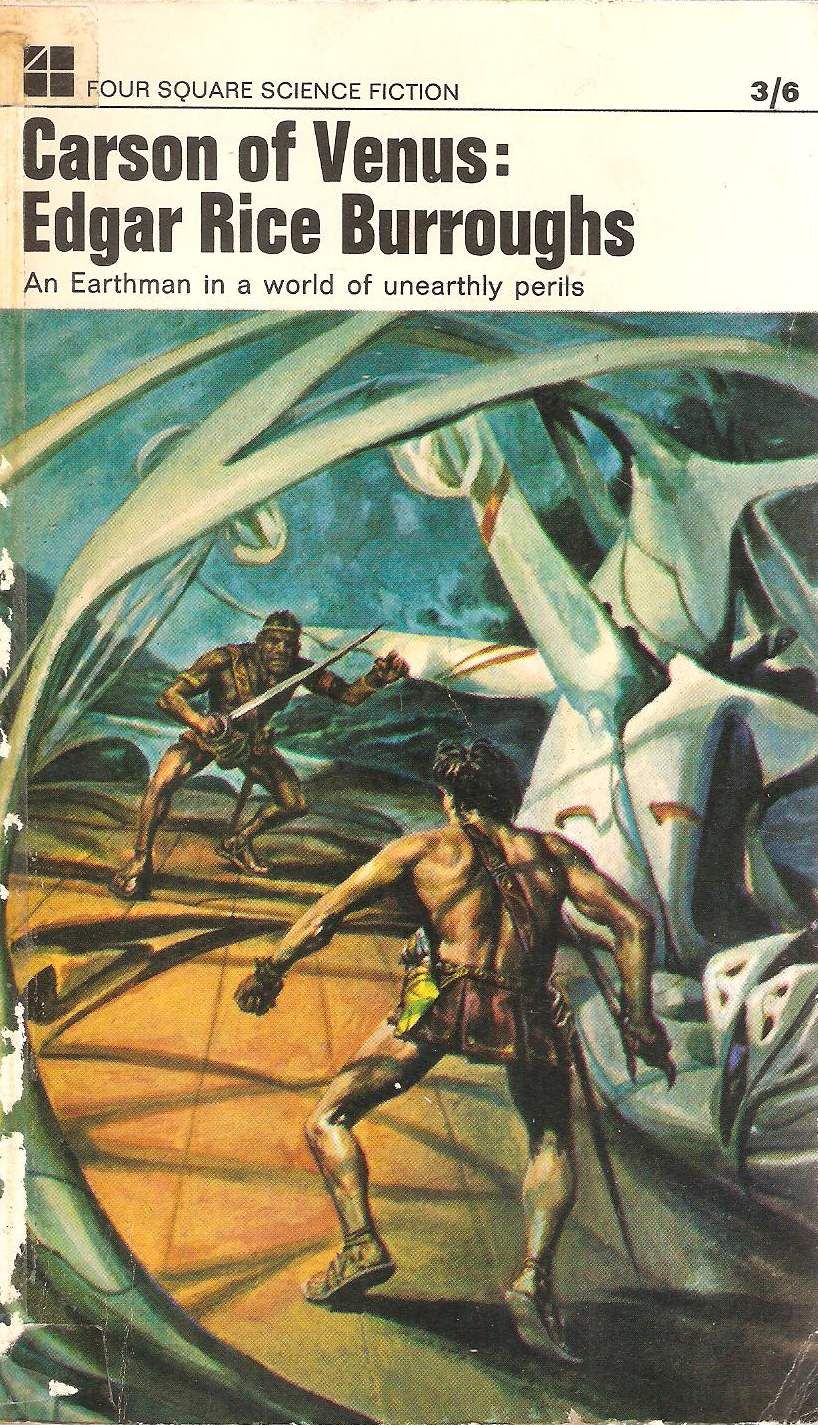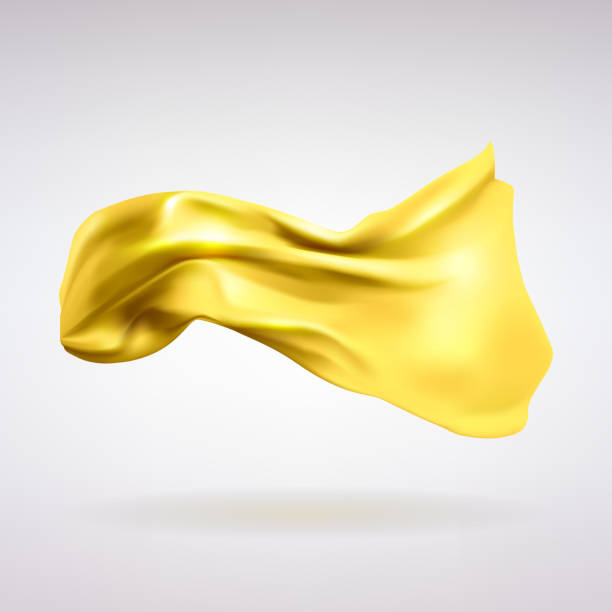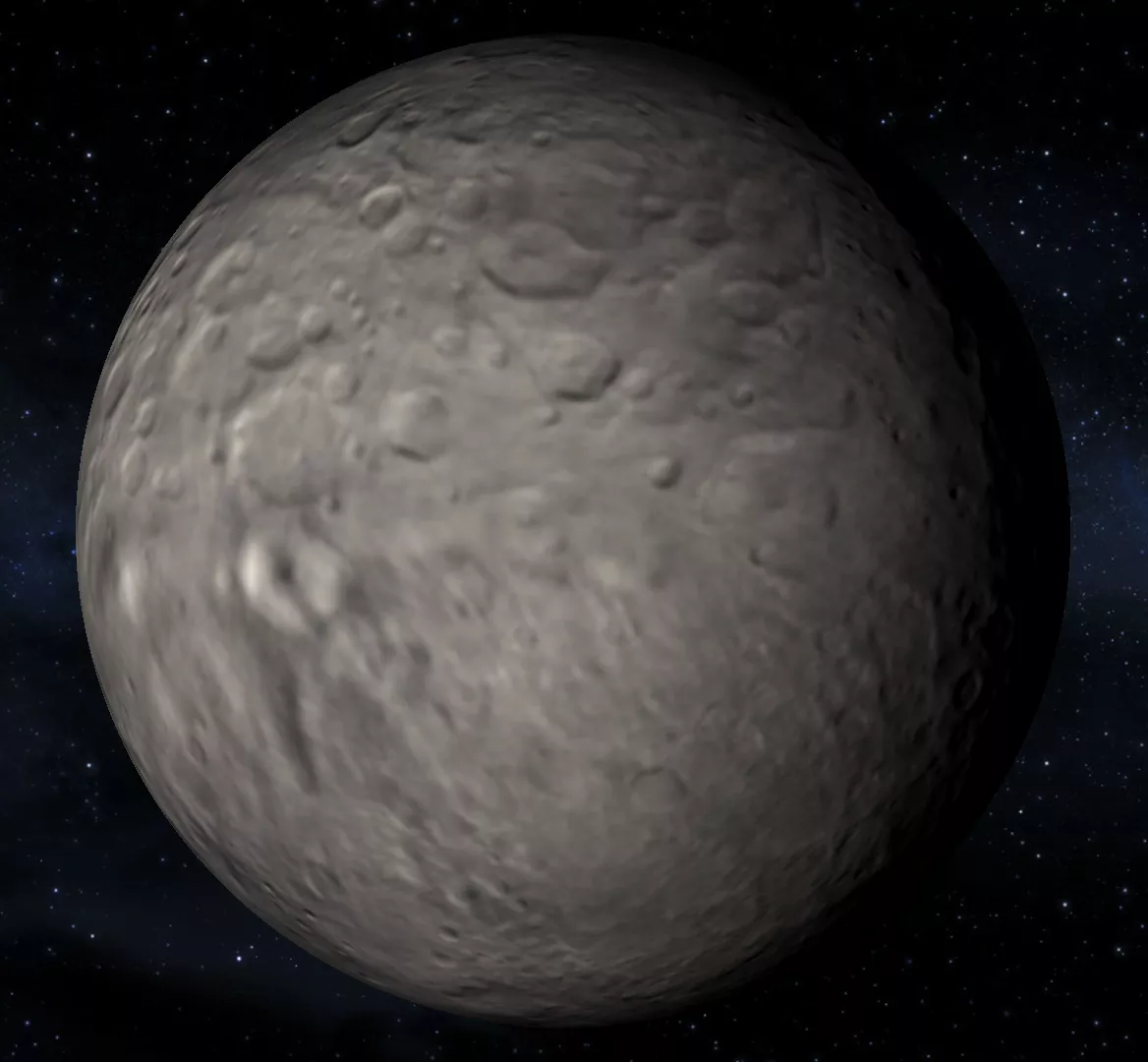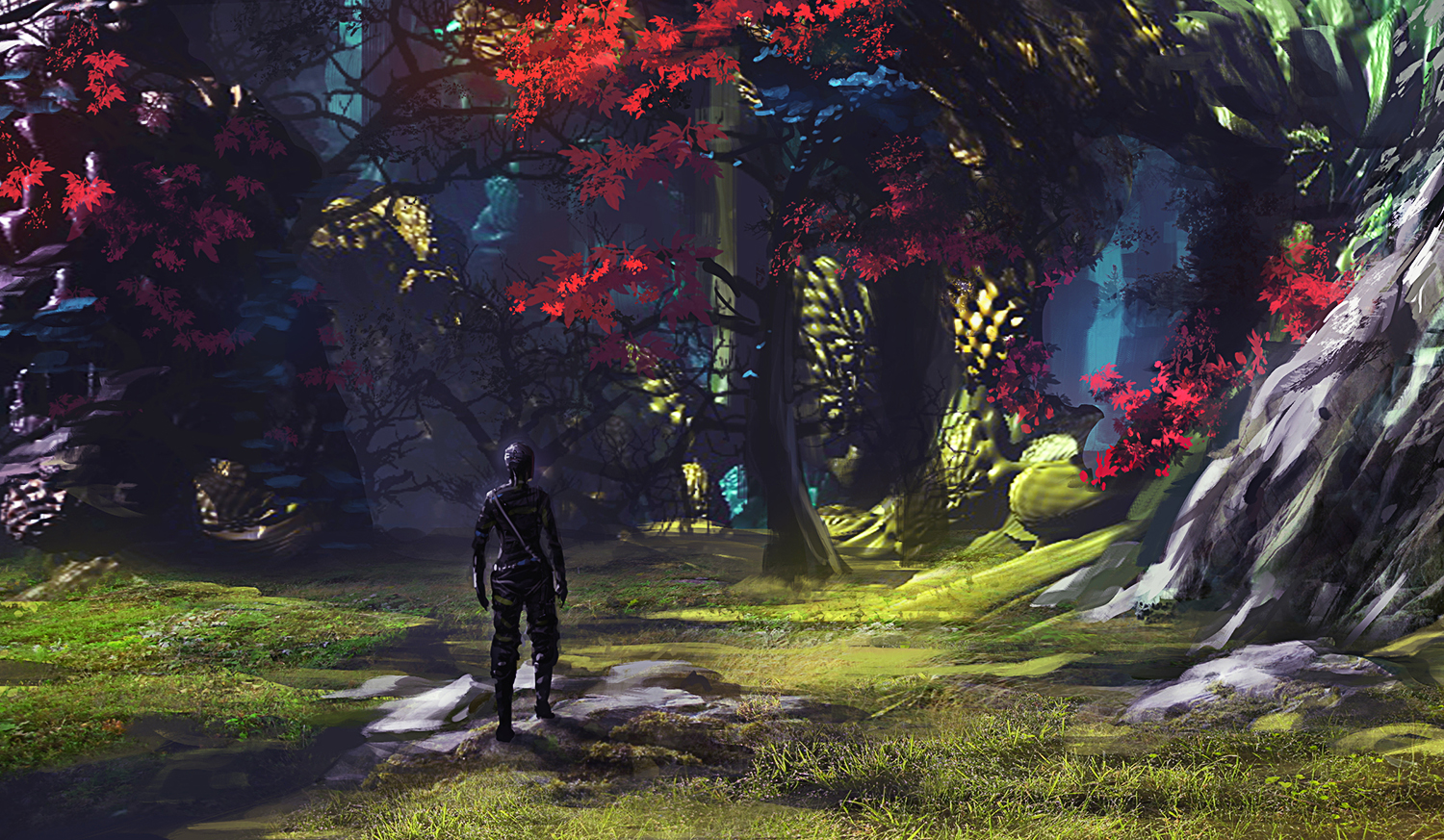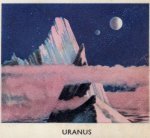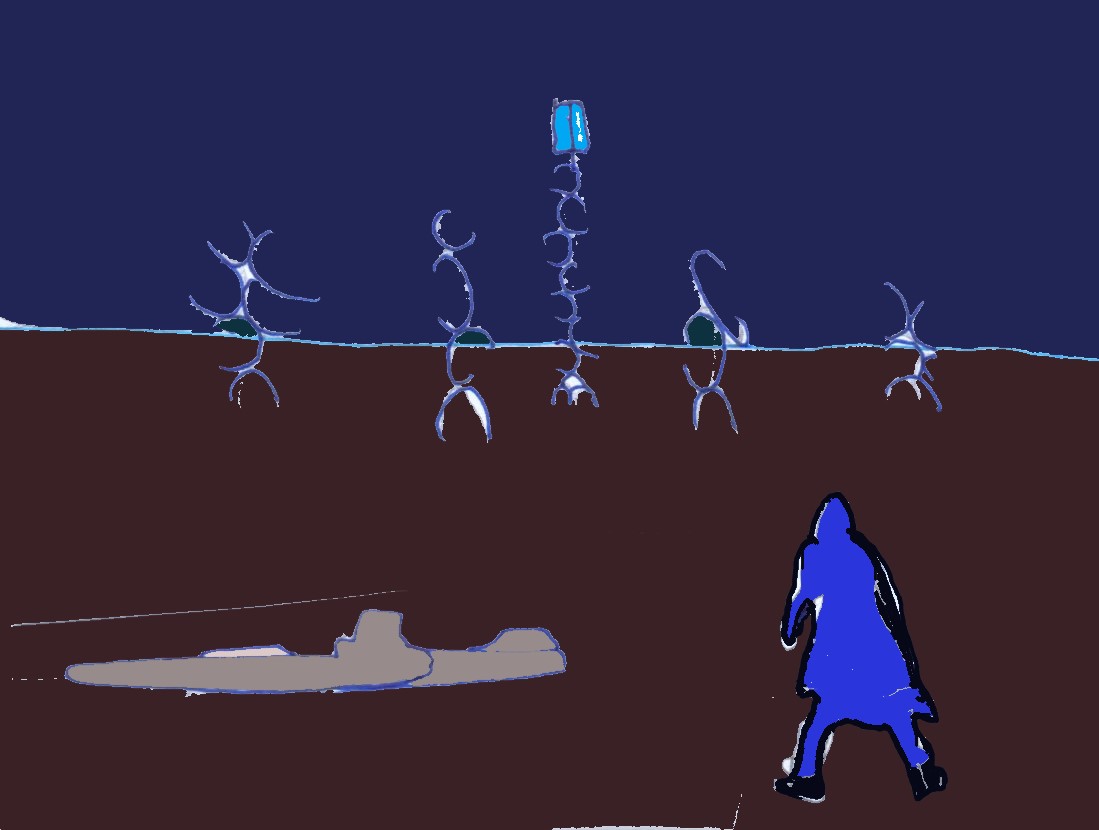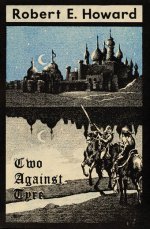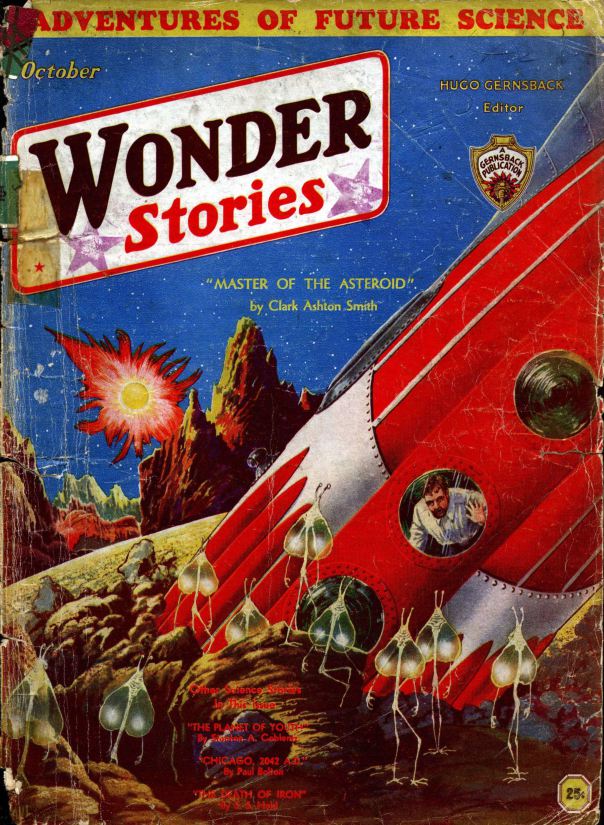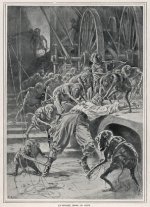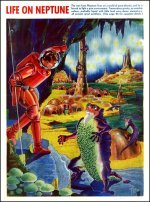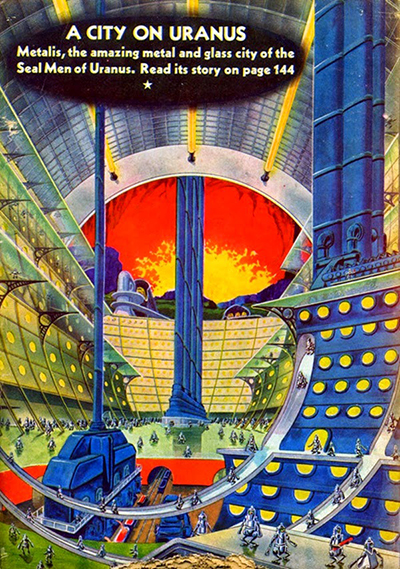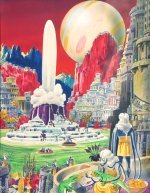- Home
- Decisive Battles of the OSS
Decisive Battles of the Old Solar System
Fictional battles are, of course, vastly preferable to real ones, insofar as in the former the only casualties are imaginary people. However, both fictional and real battles have equally forceful value as indicators of power-flow. They provide - by their occurrence, timing, course and result - the best tell-tale dial for the opportunities, constraints, strengths, limits, potentialities and actualities jostling in their mileux.
Stid: After this orotund exordium, Zendexor, I suspect you're going to treat us to a bout of droll military solemnity. Doubtless you're preparing to bring a heavy staff-college analysis to bear upon some whiz-bang space-clash out of Doc Smith or the pulp-fiction exploits of John Carter in his battle with the First Born...
Zendexor: Not straightaway. You have shrewdly gauged my ultimate intentions, but my first example comes from the realistic end of the OSS spectrum.
the battle of pico
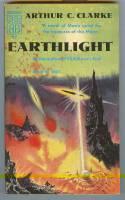 attack on the Dome
attack on the DomeEarthlight, for most of its length, is a gripping account of day-to-day life in a Moon colony. However, with an equally masterly focus upon gathering crisis, the author builds up his plot to a space-battle near the end -
Harlei: Beware, readers, this page will be full of spoilers!
Zendexor: A good point. Battles are difficult to discuss without giving away the plot. Readers, you have been warned. Spoilers will lurk after this paragraph. Before then, though, let me harmlessly reveal the novel's background. Mankind is politically divided in two. On the one hand is the Earth plus its Moon, and on the other hand an interplanetary Federation comprising far-flung colonies on Mars, Venus, Mercury and the outer planets' moons.
The causes of conflict are both economic and psychological. Earth resents losing its best brains to the Federation; the Federation blocks Earth's efforts to explore. Pressure to use force increases. But what would a twenty-second-century space conflict be like? A news commentator broadcasts his thoughts during the run-up to the crisis:
"...To talk about war, in the old-fashioned sense, seems absurd to me. Either side could inflict heavy damage on the other, but any real trial of strength could not possibly be conclusive...
"If, which heaven forbid, it should come to violence, we may see sudden raids on strategic points by specially equipped vessels which will make an attack and then retreat into space. Any talk of interplanetary invasion is pure fantasy... As I see it, the immediate danger is that something like a duel may take place - where and how is anyone's guess - as one side attempts to impress the other with its strength..."
What the commentator doesn't know, is that despite the brain-drain to the Federation, the remaining scientists and engineers of Earth have found a way to tap the treasure of heavy elements deep inside its colonial back-yard, the Moon. Exploitation of that would decisively tip the System's balance of power in favour of the home planet.
 energy-downpour splashing off the Dome
energy-downpour splashing off the DomeThe secret leaks out, and the war vessels of the Federation converge upon the heavily fortified mine-complex in the Mare Imbrium...
Even today, little has ever been revealed concerning the weapons used in the Battle of Pico. It is known that missiles played only a minor part in the engagement: in space-warfare anything short of a direct hit is almost useless, since there is nothing to transmit the energy of a shock wave. An atom bomb exploding a few hundred metres away can cause no blast damage, and even its radiation can do little harm to well-protected structures...
Purely non-material weapons played the most effective roles...
That's one sample of the objective historical style...
Stid: Which is all very well, but a space-battle with energy-weapons doesn't seem a very
promising topic for individual initiative. Bzzzzz... and that's it. Is "battle" the right word, even?
Zendexor: The narration ranges over a gamut of techniques - objective disquisition as above, a mixture of speculation by witnesses, and thoroughly human crises... but I know what you mean, Stid. How in space does the author manage to make it a real battle, considering the inhuman forces involved? How does he bring the topic full circle, as it were, using physics not to make the conflict more automatic and remote but, on the contrary, to enhance its scope for the human element? Well, watch! Watch how, in the heat of action, he slips in some human-scale cunning, while staying true to the science:
...From somewhere beyond Pico six sheaves of flame shot up into the sky at an enormous acceleration. The dome was launching its first missiles, straight into the face of the sun. The Lethe and the Eridanus were using a trick as old as warfare itself: they were approaching from a direction in which their opponent would be partly blinded. Even radar could be distracted by the background of solar interference, and Commodore Brennan had enlisted two large sunspots as minor allies...
Meanwhile on the ground, the accidental witnesses to this battle - two astronomers caught in the vicinity when their lunar vehicle broke down - reflect with surprise on the fact that they can see it at all.
...Both Wheeler and Jamieson were surprised that the battle was being fought at such short range. There was probably never more than a hundred kilometres between the antagonists, and usually it was much less than this. When one fought with weapons that travelled at the speed of light - indeed, when one fought with light itself - such distances were trivial.
The explanation did not occur to them till the end of the engagement. All radiation weapons have one limitation: they must obey the law of inverse squares. Only explosive missiles are equally effective from whatever range they have been projected: if one is hit by an atomic bomb it makes no difference whether it has travelled ten kilometres or a 1000.
But double the distance of any kind of radiation weapon and you divide its power by four owing to the spreading of the beam. No wonder, therefore, that the Federal commander was coming as close to his objective as he dared...
Awe-inspiringly, the conflict gives temporary atmosphere and weather, of a sort, to this region of the Moon:
...And now a strange thing was beginning to happen. The rays with which the battle was being fought were no longer quite invisible, for the fortress was no longer in a vacuum. Around it the boiling rock was releasing enormous volumes of gas, through which the paths of the rays were as clearly visible as searchlights on a misty night on Earth. At the same time Wheeler began to notice a continual hail of tiny particles around him. For a moment he was puzzled; then he realised that the rock vapour was condensing after it had been blasted up into the sky...
One could go on for thousands more words in praise of the author's brilliant handling of this climax to the novel...
Stid: A great battle-scene told by a writer who was allergic to all things military!
Zendexor: Yes; it's characteristic of Clarke that he makes sure that his masterpiece depicts a drawn battle. Both sides make their costly point, after which discredited governments are thrown out, the resources of the Moon are put into the hands of an independent and even-handed Lunar Republic, and life can go on. He wryly remarks, concerning his character the astronomer Wheeler:
...At the moment he felt no fear - only an immense curiosity and excitement. He had been caught, though he did not know it, by the deadly glamour of war. There is a fatal strain in men that, whatever reason may say, makes their hearts beat faster when they watch the colours flying and hear the ancient music of the drums...
Stid: A philosophic reflection which won't occur during the next step of your descent down the rungs of space-literature.
Zendexor: Let's not be snobbish, Stid. Or specist, for that matter. I say this because the next battle we're going to look at was not fought between men.
the battle of north polar jupiter
Harlei: Not fought between men, no - but arguably the outcome was as important for us as was that of the Battle of Pico.
Zendexor: I'm with you there! It was vital that the North Polar Jovian hexans be wiped out by the reptilioid Vorkulians from the Jovian South. All Solar System planetopolitical analysts are agreed on this. The hexans were a menace to all other forms of intelligent life. The Vorkulians were far preferable. Instead of being genocidal, they were merely cold towards other species, uninterested in contact and keen to keep themselves to themselves; and as good luck would have it, they were our allies of convenience against the common enemy.

Stid: I have to say, folks, that the Battle of North Polar Jupiter, as narrated in Spacehounds of IPC, doesn't come across as a subtle piece of literature to match the Battle of Pico.
Zendexor: Ask any of the experts at West Point or Sandhurst, and they'll tell you that subtlety for its own sake is pointless. The thing to do is to wallop the enemy and get the business over with. Get there fastest with the mostest, as U.S.Grant is supposed to have said.
Stid: Here we go. Well, you might as well also cite Clausewitz, since total war is quite the hexan policy.
Harlei: Precisely; it honestly is no use trying to be subtle with hexans. The only good hexan is a dead hexan, and even that may be over-generous.
Zendexor: So thought the Vorkulians. Utterly fed up, they wished to put an end to the northern menace once and for all. They thus gathered what they estimated must be sufficient force, and then set off on an unstoppable advance towards the enemy Pole, annihilating all the units of the hexan fleet that were sent against them, until, reaching the hexan homeland itself...
...every Vorkul in the vast fleet coiled even more tightly about his bars, for the real battle was about to begin. The city of the hexans lay before them, all her gigantic forces mustered to repel the first real invasion of her long and warlike history. Mile after mile it extended, an orderly labyrinth of spherical buildings arranged in vast interlocking series of concentric circles - a city of such size that only a small part of it was visible, even to the infra-red vision of the Vorkulians...
The hexan city looked unprotected, apart from a moat. There wasn't even a wall. But this undefended appearance was quite misleading. The surrounding verdant plain
...disappeared in a blast of radiance, revealing a transparent surface, through which could be seen masses of machinery filling level below level, deep into the ground as far as the eye could reach; and from the bright liquid of the girdling moat there shot vertically upward a coruscatingly refulgent band of intense yellow luminescence...
Stid: Oh brother. This is Doc Smith's style all right. Coruscatingly refulgent band of intense luminescence... What can one say?
Harlei: One can say it's fine in its own terms. Quite good terms, if your job is to describe one side walloping another side with vastly powerful weapons.
Zendexor: And the Vorkulians are prepared to wallop the hardest. The hexan defences had been hitherto invincible... but they can't deal with the contents of the next three pages, in which we read of the weaponry which it had taken the mightiest intellects of Vorkulia two long lifetimes to evolve. They wreak upon their enemy a final annihilating "Saturnalia of destruction" (un-apt phrase for a battle on Jupiter)...
You know what Doc Smith's ebullient prose is like, so I won't quote from those three pages.
Suffice it to say, the Vorkulians turn out to have "the mostest".
Stid: Exhaustingly so. Now can we pan around towards subtlety once more?
Zendexor: Very well. Enter ERB and the Battle of Dor.
Stid: Are you serious? Yes, I see you are... Go on then, Zendexor, let's hear from the staff college about John Carter's military wisdom.
the battle of dor
Zendexor: Let me first pay tribute to authorial skill. Burroughs' work is revered by legions of fans, but even so he remains under-estimated in quite a few respects. The Battle of Dor (my name for it - it's not named in the narrative) occupies 25 climacteric pages of The Gods of Mars, and it's safe to call it an under-appreciated masterpiece of story-telling.
I say "under-appreciated" because not enough credit is given to ERB's faultless pacing as he juggles themes and steers through cross-currents of fortune for 25 mesmeric pages.
Dor is not a "straight" battle like Bannockburn; more a many-sided one like Austerlitz or Waterloo. In literature, one can liken it to Tolkien's Battle of the Pelennor Fields in The Lord of the Rings - a confluence of varied forces from more than just two directions. The navy of Helium, under the command of John Carter, is pitted against three different foes, red, white and black: namely the Zodangans, the therns and the First Born -
Stid: And, being a hero, he muddles through.
Zendexor: Now, be fair: you must give him credit for possessing the great general's quality of "presence of mind". He knows just what to do when a scout rushes to the deck of the flagship to report:
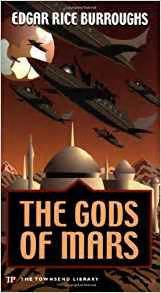
..."A great fleet of battleships south-south-east, my Prince," he cried. "There must be several thousands and they are bearing down directly upon us."
"The thern spies were not in the palace of John Carter for nothing," said Kantos Kan to me. "Your orders, Prince."
"Dispatch ten battleships to guard the entrance to Omean, with orders to let no hostile vessel enter or leave the shaft. That will bottle up the great fleet of the First Born.
"Form the balance of the battleships into a great V with the apex pointing directly south-south-east. Order the transports, surrounded by their convoys, to follow closely in the wake of the battleships until the point of the V has entered the enemies' line, then the V must open outward at the apex, the battleships of each leg engage the enemy fiercely and drive him back to form a lane through his line into which the transports with their convoys must race at top speed that they may gain a position above the temples and gardens of the therns..."
Stid: But look at what goes wrong. Carter orders that the First Born must be bottled up underground while he deals with the therns - but he's not quick enough... the ships of the blacks manage to force their way up through the volcanic shaft... and as if that were not enough, the hostile Zodangans' arrival on the scene takes him by surprise.
Harlei: You can't blame him for the treachery of others, Stid.
Stid: Treachery, divided loyalties, whatever you call it - the point is, trouble from that quarter was predictable, in the situation of religious upheaval combined with political turmoil which the Empire of Helium was going through at that time.
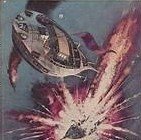
Zendexor: So, you're saying, Carter should have allowed for it. I'll admit, he was rescued on that occasion by the quick-wittedness of one of his officers - Kantos Kan has the idea of breaking out the colours of the Prince of Helium and persuading Zat Arras' fleet to change allegiance. But another winning idea can be credited to Carter, namely, the ploy of getting therns and First Born to fight each other. Those nations weren't natural allies, hating each other as much as they each hated the men of Helium.
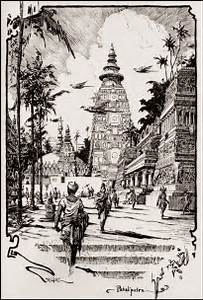
Stid: All right, but listen to my main indictment against Carter as strategist. His two-pronged attack on Issus, via Omean and the gardens, involves one group, led by Carter himself, attempting a surprise attack via the underground route to the enemy Temple. It's an understandable decision - he's desperate to rescue his princess - but he leads his men straight into an appalling trap. The First Born stop the pumps which normally prevent the subterranean realm from being flooded...
...Before the last company filed from the chamber the water was ankle deep, and that the men were nervous was quite evident. Entirely unaccustomed to water except in quantities sufficient for drinking and bathing purposes the red Martians instinctively shrank from it in such formidable depths and menacing activity. That they were undaunted while it swirled and eddied about their ankles, spoke well for their bravery and their discipline.
Harlei: It's a good example of the 3-D realism, the scene-embodying expertise shown by ERB in his account of the battle.
...The march of the troops through the corridor was as rapid as was consistent with the number of men that moved through so narrow a passage, but it was not ample to permit us to gain appreciably on the pursuing tide. As the level of the passage rose, so, too, did the waters rise until it soon became apparent to me, who brought up the rear, that they were gaining rapidly upon us. I could understand the reason for this, as with the narrowing expanse of Omean as the waters rose towards the apex of its dome, the rapidity of its rise would increase in inverse ratio to the ever-lessening space to be filled...
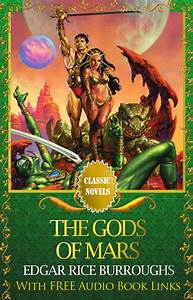
Zendexor: Shuddersome! And no doubt Stid thinks Carter should have subsequently faced a court of inquiry... but the Prince of Helium redeems himself by his heroic leadership in a sticky situation. Incidentally the passage shows Burroughs giving us a rare glimpse into an inner weakness of his Martians, for the brave men of Helium, it turns out, are on the verge of succumbing to their phobias:
...The waters were now swirling about my waist. The men directly before me were quickly becoming panic-stricken. Something must be done at once or they would rush forward upon their fellows in a mad stampede that would result in trampling down hundreds beneath the flood and eventually clogging the passage beyond any hope of retreat for those in advance...
Stid: I'm not trying to be unkind to Carter; he himself was aware of his fault.
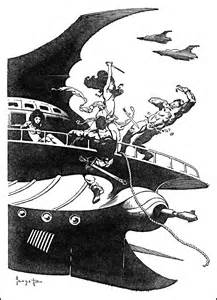
...A thousand times I berated myself for being drawn into such a trap as I might have known these pits easily could be. Now I saw that it would have been much better to have kept our force intact and made a concerted attack upon the temple from the valley side, trusting to chance and our great fighting ability to have overwhelmed the First Born and compelled the safe delivery of Dejah Thoris to me...
Harlei: Let's shelve the court of inquiry. Carter wins and gets his princess back - though not till the end of the next book. All's well that ends well.
the battle of neptune
Zendexor: And now for the mightiest, most decisive battle of all.
It decided the fate of the Solar System - in fact, the System's very existence in its present form.
The ruthless Neptunian civilization, feeling the onset of a cold death, was determined to survive at whatever cost.
The Neptunians therefore hatched a scheme involving the application of forces whereby they would increase the rotation of the Sun (don't ask me exactly how) until the Sun by centrifugal force split into two stars, which would orbit each other at a distance calculated to keep Neptune comfortably warm while all the other planets were (regrettably) destroyed.
Fortunately for Earth, we had space-fighters so heroic that they could win battles in which just about every paragraph ends with an exclamation mark.
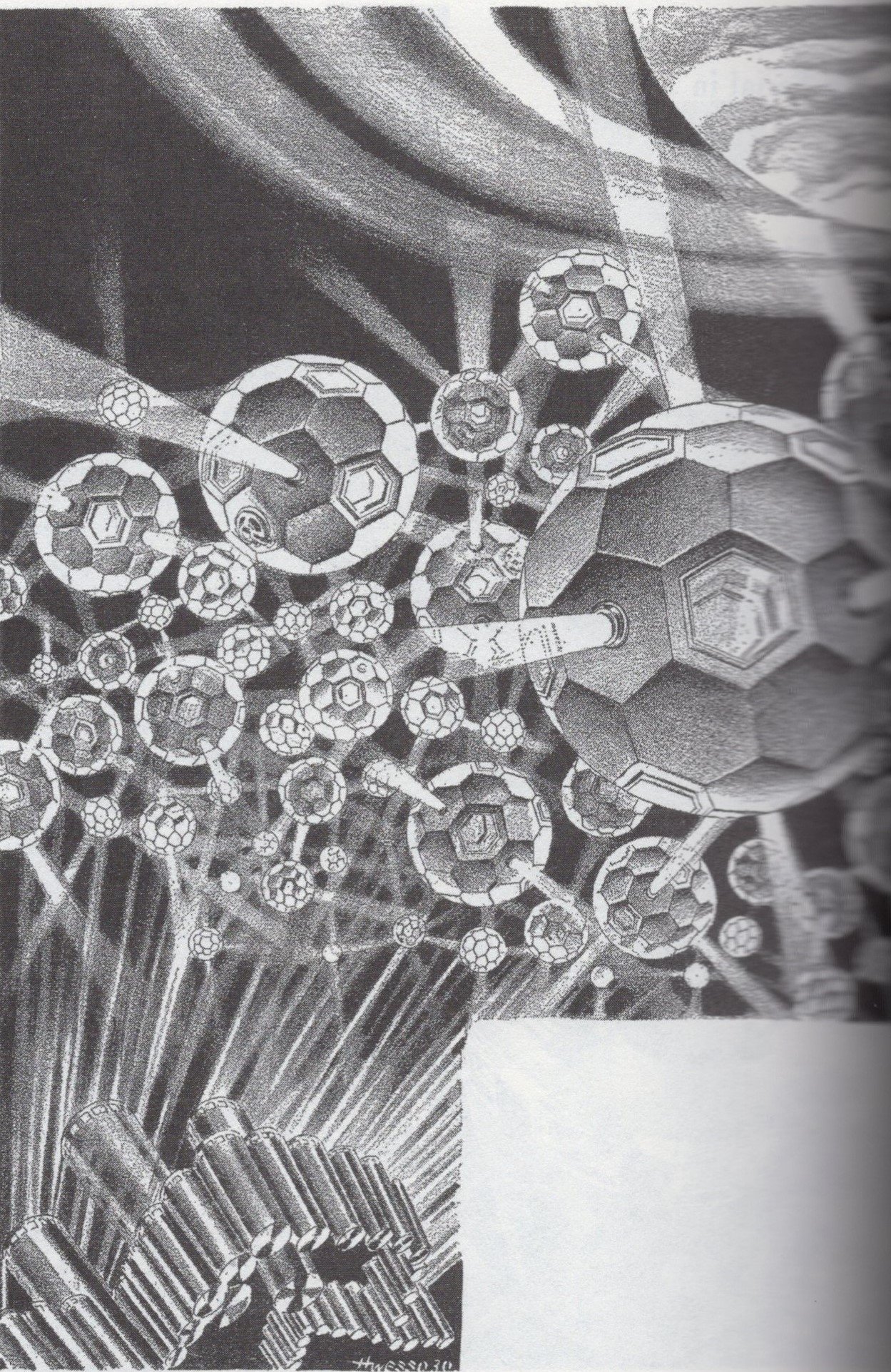 preliminary skirmish near Saturn
preliminary skirmish near SaturnHere is a fair sample of the kind of style and sentence-structure you'll find in The Universe Wreckers.
...And in the next moment, as the Neptunian column flashed up through that opening likewise in hot pursuit of us, never suspecting us of waiting there for it, from all the fliers of our great circle there had radiated toward them storm on storm of deadly concentrated rays, rays that smote them with blinding shock as their column rushed upward and that crashed through hundreds of their upflashing cylinders even as they burst up through the opening, before ever they could catch sight of us around them!
You can really picture the young Edmond Hamilton bashing away at his typewriter as he churns out this stuff. He was only a couple of years away from becoming a great writer... but he wasn't there yet.
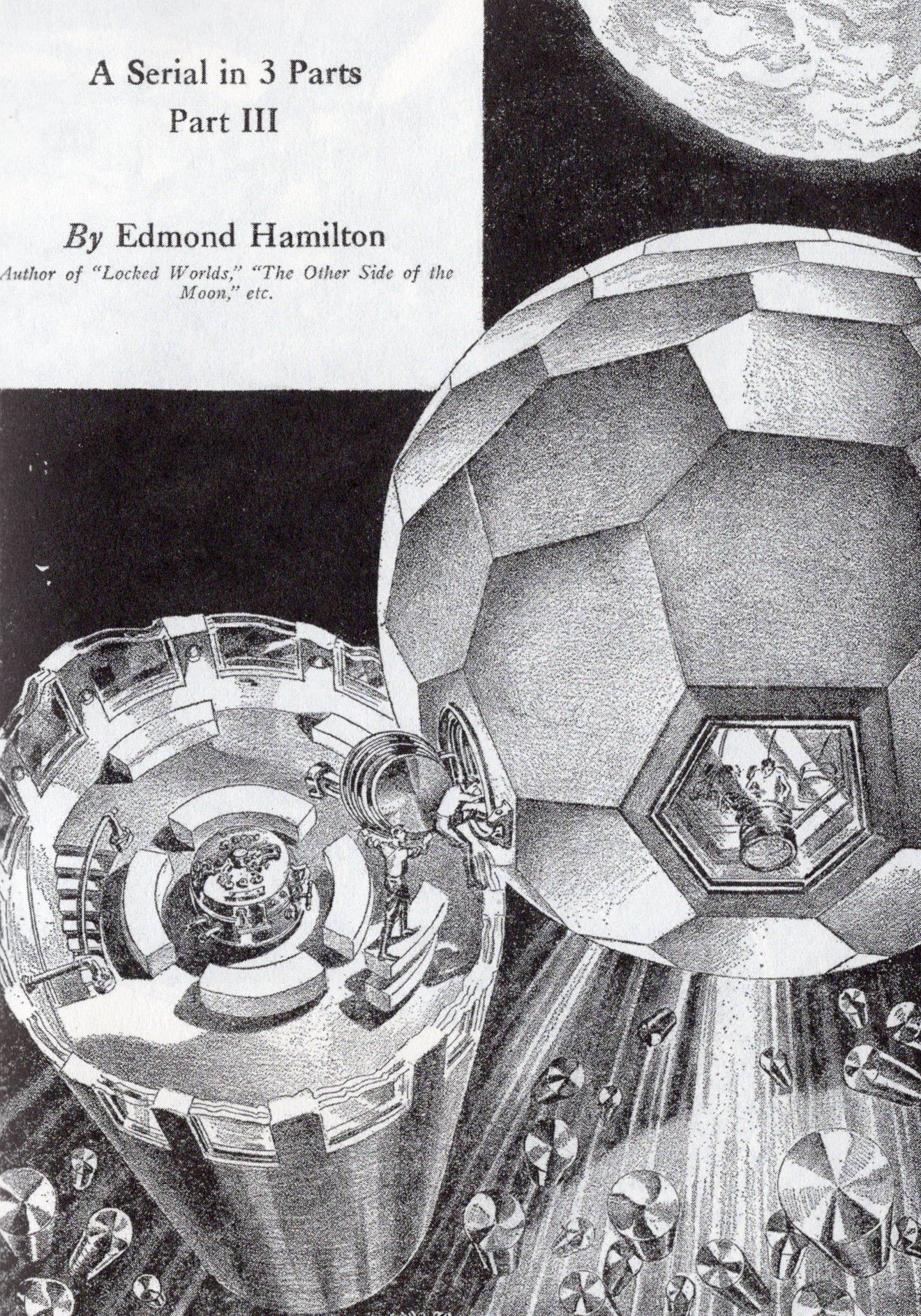
Edgar Rice Burroughs, The Gods of Mars (1913, 1918); Arthur C Clarke, Earthlight (1955); Edmond Hamilton, The Universe Wreckers (Amazing Stories, May-July 1930); E E "Doc" Smith, Spacehounds of IPC (1931, 1947)





